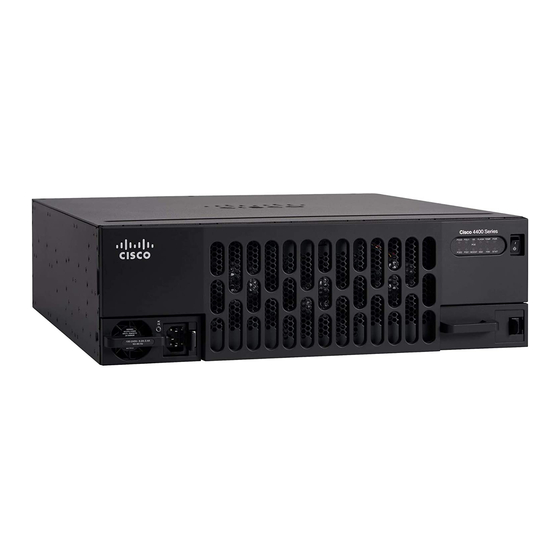Cisco 4700M Upgrade Manual - Página 22
Procurar online ou descarregar pdf Upgrade Manual para Router de rede Cisco 4700M. Cisco 4700M 24 páginas. Upgrading memory
Também para Cisco 4700M: Manual de instalação (18 páginas), Manual de substituição (16 páginas)

Replacing Network Processor Modules
Replacing Network Processor Modules
Take the following steps to replace a network processor module:
Step 1
Step 2
Step 3
Step 4
Caution
underlying motherboard could be damaged. The maximum screw torque is 7 inch-lb.
Replacing the Component Tray
Take the following steps to replace the component tray in the chassis shell:
Step 1
Step 2
Replacing the Final Connections to the Router
Take the following steps to make the final connections to the router:
Step 1
Step 2
Warning
and reinstate power by moving the handle of the circuit breaker to the ON position.
Step 3
Step 4
22 Upgrading Cisco 4500, Cisco 4500-M, Cisco 4700, and Cisco 4700-M Memory
Hold the network processor module by its handle, align it with the grooves in the chassis
(not shown) and over its connector, and push it lightly against the chassis wall. (See
Figure 7.)
Gently, without bending the connector pins, push the network processor module into place,
inserting the male network processor module connector into the female network processor
module connector on the motherboard.
Replace the module mounting screw on the end of the network processor module. (See
Figure 7.)
If the module has external rear mounting screws to attach the network processor module to
the rear of the chassis, replace the screws at this time.
Do not overtorque the module mounting screw. The network processor module or the
Reinsert the component tray into the shell, pushing on the back of the tray while at the same
time pressing on the chassis release screw (see Figure 3) with the thumb of your right hand.
Retighten the chassis release screw.
If you have an AC-powered system, plug the system power cord into a 3-terminal,
single-phase power source that provides power within the acceptable range (100–240 VAC,
50–60 Hz, 3.0–1.5 A).
If you have a DC-powered system, rewire the DC-input power supply (40 to 72 VDC) to
the terminal block. The proper wiring sequence is ground to ground, positive to positive,
and negative to negative. (See Figure 17.) After connecting the DC power cables, use a
screwdriver to reinstall the terminal block cover.
After wiring the DC power supply, remove the tape from the circuit breaker switch handle
Turn ON the system power switch. The power LED on the front should go ON.
Check the OK LED on the right side of the front panel (see Figure 1) to verify that it goes
ON after a few seconds delay when booting.
